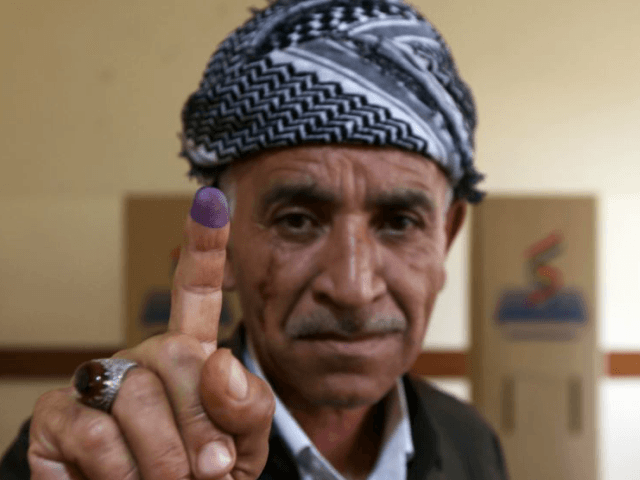Widely feared risks of “unrest” expressed by the United States and other countries opposed to the independence referendum held by northern Iraq’s autonomous Kurdistan Regional Government (KRG) failed to materialize Monday, the day of the vote.
On Sunday, the American embassy in Baghdad cautioned U.S. citizens to stay away from Iraqi Kurdistan during the vote, which drew a high voter turnout and is expected to pass.
America’s travel warning is a testament to the U.S. opposition to Kurdistan’s independence, a position that echoes the objection to the referendum by neighboring Iraq, Turkey, Iran, and Syria.
Tensions between opponents and proponents of the referendum did intensify in the days leading to it.
“A few days ahead of the Kurdistan referendum on independence, an ethnic clash took place between a group of Kurds and Turkmens in [Kurdish-held] Kirkuk on Sept. 19,” reports Al-Monitor. “Local police deployed in different parts of the city to prevent the development of the deadly clash.”
“The conflict has been largely peaceful until now, but in recent days both sides have threatened to use military force to protect their interests,” adds the Associated Press (AP). “In Kirkuk, the epicenter of the territorial dispute, the governor imposed a nighttime curfew after the vote.”
The KRG resisted calls by the United Nations and various countries, including allies like the United States, to drop the referendum.
As of 7 p.m. (local) Monday, the time when the polls closed, there were no indications that violence had occurred during the vote.
AP reports:
Iraq’s Kurds hope Monday’s non-binding referendum on independence marks the start of a peaceful, negotiated break with Baghdad, but it may have instead placed them on a new collision course with Iraq and its neighbors.
…
The vote was held peacefully, but the coming days could bring escalating unrest as the Kurds press ahead toward independence, something opposed by virtually the entire international community, including their close ally, the United States.
KRG officials reportedly expect to have the preliminary results ready Tuesday and announce the final count later this week.
The contentious referendum drew a strong voter turnout, Kurdish media outlet Rudaw reports, citing preliminary data.
“Voter turnout across Kurdistan was 78 percent until 6 p.m. [local time], which was one hour before voting stations closed,” Rudaw learned from the KRG electoral commission.
A day ahead of the referendum, the Baghdad-based U.S. embassy implemented contingency plans, citing concerns of “unrest.”
The American consulate said in a statement announcing its travel warning to Iraqi Kurdistan:
U.S. Mission Iraq will temporarily limit personnel movements as a precautionary measure. In particular, U.S. citizens should avoid travel into and within territories disputed between the Kurdish Regional Government and the Government of Iraq.
As a reminder, U.S. citizens should maintain a heightened sense of security awareness and take appropriate measures to enhance their personal security at all times when living and working in Iraq.
As Kurds were casting their vote on Monday, Stephane Dujarric, the spokesperson for the U.N.’s secretary-general, reiterated concerns about “the potentially destabilizing effects of today’s referendum in the Kurdistan region of Iraq.”
Iraq’s neighbors Turkey, Iran, and Syria have also expressed objections to the KRG’s efforts to become an independent state, fearing it could fuel separatism among their own Kurds.
The United States considers the KRG’s Peshmerga forces to be one of the most efficient allies against the Islamic State (ISIS/ISIL).
Nevertheless, in denouncing the vote, the Trump administration urged the KRG to cancel it because it was “distracting” from the international efforts against the Islamic State (ISIS/ISIL).
Although various analysts have described Israel as the only country that supports Iraqi Kurdistan’s independence, Russian Foreign Minister Sergey Lavrov told Rudaw in July that Iraqi Kurdistan “must be” allowed to hold an independence referendum this year because they have the “right” to express their aspirations to break away from Iraq.
Moreover, days before the vote, the Kremlin-controlled oil company Rosneft announced that it is investing nearly $1 billion in gas pipelines in Iraq’s Kurdistan region.
The move is expected to expand Russia’s “commitment to the region ahead of its independence vote to help it become a major exporter of gas to Turkey and Europe,” reported Reuters.
Critics like Russian Timur Akhmetov, a Kremlin-Turkish relations expert at the Russian International Affairs Council (RIAC), have described Moscow’s position on the referendum as “ambiguous.”

COMMENTS
Please let us know if you're having issues with commenting.